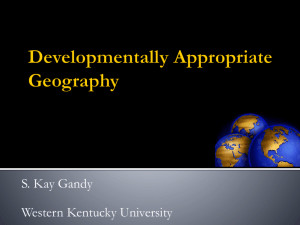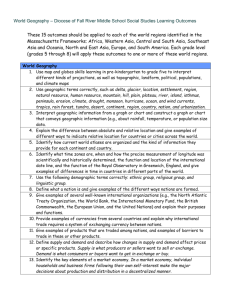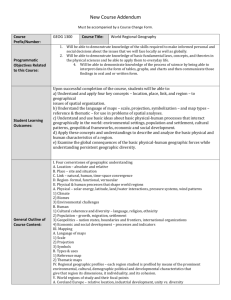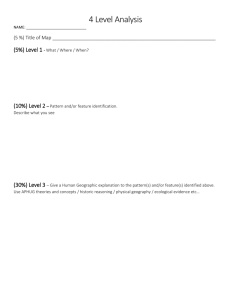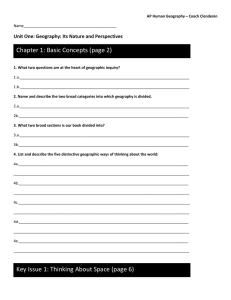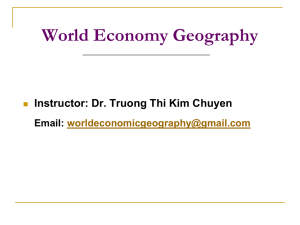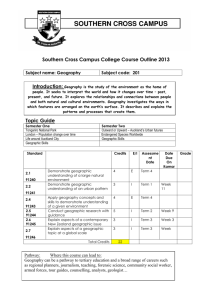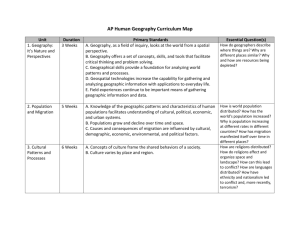Geography Unit Overview
advertisement
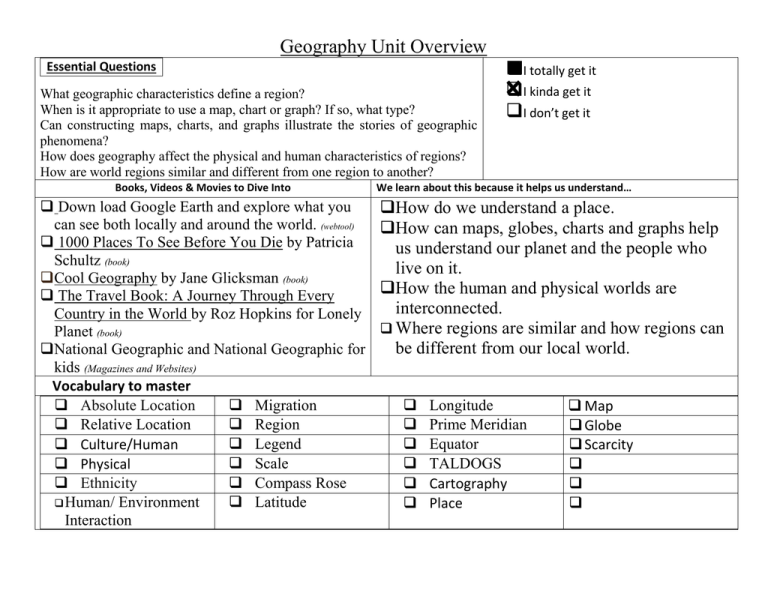
Geography Unit Overview Essential Questions What geographic characteristics define a region? When is it appropriate to use a map, chart or graph? If so, what type? Can constructing maps, charts, and graphs illustrate the stories of geographic phenomena? How does geography affect the physical and human characteristics of regions? How are world regions similar and different from one region to another? Books, Videos & Movies to Dive Into Down load Google Earth and explore what you can see both locally and around the world. (webtool) 1000 Places To See Before You Die by Patricia Schultz (book) Cool Geography by Jane Glicksman (book) The Travel Book: A Journey Through Every Country in the World by Roz Hopkins for Lonely Planet (book) National Geographic and National Geographic for kids (Magazines and Websites) Vocabulary to master Absolute Location Migration Relative Location Region Legend Culture/Human Scale Physical Ethnicity Compass Rose Human/ Environment Latitude Interaction I totally get it I kinda get it I don’t get it We learn about this because it helps us understand… How do we understand a place. How can maps, globes, charts and graphs help us understand our planet and the people who live on it. How the human and physical worlds are interconnected. Where regions are similar and how regions can be different from our local world. Longitude Prime Meridian Equator TALDOGS Cartography Place Map Globe Scarcity Geography Unit Reflection 1. Fill in the boxes on the overview sheet according to the key. 2. Add 3 words to the vocabulary list that we discussed but are not listed. 3. Choose one of the following activities and complete it: Create a map of Salem Middle School using TALDOGS. Make sure to identify at least 5 important places in the school. (For example: your pod, cafeteria, lake, etc.) Create an acronym or saying for the 7 continents to help students remember. Why do you think TALDOGS is useful in a time when we have GPS and Mapquest? End of Unit Test Score ___% Geography Unit Overview Essential Questions What geographic characteristics define a region? When is it appropriate to use a map, chart or graph? If so, what type? Can constructing maps, charts, and graphs illustrate the stories of geographic phenomena? How does geography affect the physical and human characteristics of regions? How are world regions similar and different from one region to another? Books, Videos & Movies to Dive Into Down load Google Earth and explore what you can see both locally and around the world. (webtool) 1000 Places To See Before You Die by Patricia Schultz (book) Cool Geography by Jane Glicksman (book) The Travel Book: A Journey Through Every Country in the World by Roz Hopkins for Lonely Planet (book) National Geographic and National Geographic for kids (Magazines and Websites) Vocabulary to master Absolute Location Migration Relative Location Region Legend Culture/Human Scale Physical Ethnicity Compass Rose Human/ Environment Latitude Interaction I totally get it I kinda get it I don’t get it We learn about this because it helps us understand… How do we understand a place. How can maps, globes, charts and graphs help us understand our planet and the people who live on it. How the human and physical worlds are interconnected. Where regions are similar and how regions can be different from our local world. Longitude Prime Meridian Equator TALDOGS Cartography Place Map Globe Scarcity Geography Unit Reflection 1. Fill in the boxes on the overview sheet according to the key. 2. Add 3 words to the vocabulary list that we discussed but are not listed. 3. Choose one of the following activities and complete it: Create a map of Salem Middle School using TALDOGS. Make sure to identify at least 5 important places in the school. (For example: your pod, cafeteria, lake, etc.) Create an acronym or saying for the 7 continents to help students remember. Why do you think TALDOGS is useful in a time when we have GPS and Mapquest? End of Unit Test Score ___%
